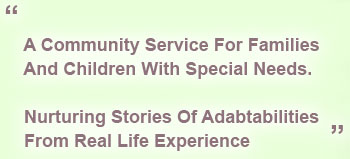Nutrition and Children with Special Health Care Needs
Children with special health care needs are similar to children without special heath care needs. They all require good nutrition to grow and develop. As a group, however, CSHCN have more frequent problems that may alter their growth, diet, feeding and eating behavior, and bowel and fluid management. When these problems are not addressed, it will be detrimental for the child.
The most common problems are:
- Altered growth (underweight, overweight, short stature)
- Inadequate energy and nutrient intake to support growth and health
- Feeding problems related to oral-motor and/or behavioral difficulties
- Medication-nutrient interactions
- Need for enteral (tube) feeding
- Chronic constipation or diarrhea
Nutritional Assessment
Nutrition assessment used to define nutritional status using medical, social, nutritional, and medication histories. Once the nutritional assessment process is complete, the nutritional plan of care can be developed and implemented. The goals of nutritional assessment are:
- To identify individuals who require aggressive nutritional support
- To restore or maintain an individual’s nutritional status
- To identify appropriate MNT’s
- To monitor the efficacy of these therapies
Nutrition or Diet History
A review of an individual’s usual patterns of food intake. In clinic we use a three day diet history/food diary. Food that is eaten is recorded the same day it is eaten. The individual’s nutrient intake is then calculated and averaged at the end of the day or over three days and then compared to the Recommended Dietary Allowances.
Download a 3 Day dietarey record
The Nutritional Plan of Care
After defining the nutritional problem an appropriate intervention needs to be made. Because socioeconomic circumstances can affect the dietary intake and health, referrals are made to needed government programs; ex: WIC, Food Stamp Program, The Heat Program, Housing Authority, and Food Bank . Many of these resources can be accessed through www.Utahclicks.org
Now where do I go from here?
Start with a few websites:
www.eatright.org ( a site for many handouts for family and child—these are accessible without a login).
www.fitness.gov (activity ideas to start moving).
www.schoolmenu.com (kids oriented games and media for motivation)
http://health.utah.gov/able/otherresources/resourceslinks.html#nutrition (a dozen websites on Able’s list).
Suggested Referrals to get started:
www.health.utah.gov/wic (nutrition services available in many counties for eligible clients)
http://extension.usu.edu/fsne/ (classes for healthy nutrition—especially for rural communities through local county extension offices).
http://intermountainhealthcare.org/xp/public/primary/docsclinics/clinics/nutrition.xml (referral to Primary Children’s Medical Center for evaluation with possible financial support through the a sliding fee scale. Direct number for appointment 801-662-1600).








Social Networks
Follow Us